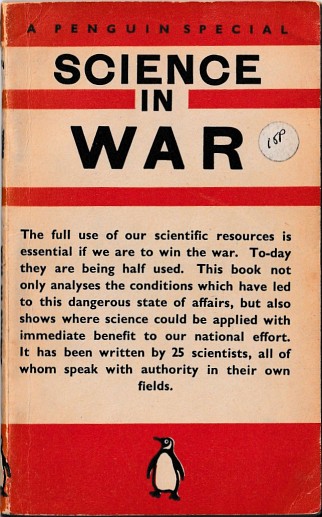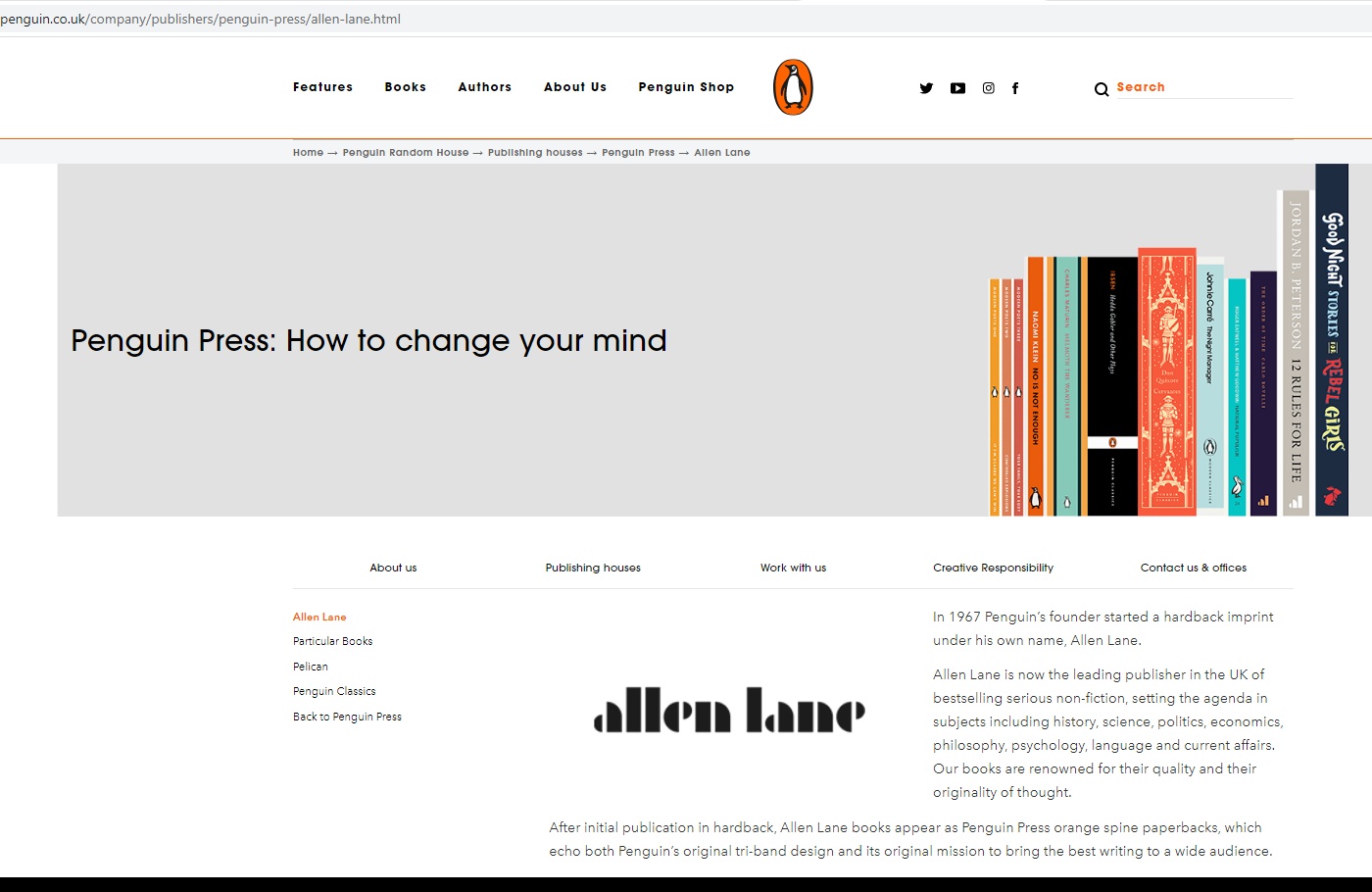Selected Reviews by Subject:- Film, TV, DVDs, CDs, media critics | 'Holocaust' | Jews, Christians, Moslems | Race | Revisionism | Women | Bertrand Russell | Richard Dawkins | Martin Gardner | H G Wells
Simple amazon reader's attitude. Or fake rented reviewer. No wonder wars happen.
only 1 review in amazon/ Scientists challenge establishment bureaucracy Reviewed in the United States on September 2, 2019
This amazing short book was written quickly. Its goal was to shake up the existing bureaucracy and establishment in Britain in the relatively early days of the second world war. Penguin books had only been in existence for a few years when a fortuitous dialog led to a collective of scientists (they are anonymous) to write this polemic. It hammered the point that the path of the war and Britain's fate would be largely dependent on how scientific advances were called upon to improve efficiency, make better military tools. The point is made that Germany was aggressively taking advantage of its scientists, technological and industrial innovation. A fascinating book that issues many challenges to the establishment. The criticism that decision makers did not pay due attention to the scientific perspective would have been very contentious in its day. History has revealed that the perspective offered in this book was right. The argument of the importance of science remains relevant today. There was a moral condemnation of profiteering in World War II. Not only has that gone, but lobbyists protect profiteering by sowing doubt about scientific insights. Science in War provides a fascinating perspective of its own time, and lessons for the present.
only 1 review in amazon/ Scientists challenge establishment bureaucracy Reviewed in the United States on September 2, 2019
This amazing short book was written quickly. Its goal was to shake up the existing bureaucracy and establishment in Britain in the relatively early days of the second world war. Penguin books had only been in existence for a few years when a fortuitous dialog led to a collective of scientists (they are anonymous) to write this polemic. It hammered the point that the path of the war and Britain's fate would be largely dependent on how scientific advances were called upon to improve efficiency, make better military tools. The point is made that Germany was aggressively taking advantage of its scientists, technological and industrial innovation. A fascinating book that issues many challenges to the establishment. The criticism that decision makers did not pay due attention to the scientific perspective would have been very contentious in its day. History has revealed that the perspective offered in this book was right. The argument of the importance of science remains relevant today. There was a moral condemnation of profiteering in World War II. Not only has that gone, but lobbyists protect profiteering by sowing doubt about scientific insights. Science in War provides a fascinating perspective of its own time, and lessons for the present.
SCIENCE IN WAR. 'Penguin Special' S74 (1940)

From Nature 27 July 1940
THIS [Science in War] is a tract for the times, which every scientific worker should read. There will often be disagreement with the views advanced, but it is eminently desirable that they should be aired. The main thesis of the book is that Great Britain has not learned the scientific lesson, of the war of 1914–18 nearly so well as Germany, and that part of the responsibility for this state of affairs lies at the door of men of science themselves.
This type of quotation is typical of all supposedly scientific publications. The New Scientist and Scientific American all treat science as a butt of the Jews in control of policy itself.
Looking back, it's clear the point of Science in War is simply to support war against Germany, or perhaps more accurately against goyim of all types, in alliance with the Jews of the USA and USSR. There is absolutely no concern over stopping or minimising war. Jews love war, fought by other people. The interesting detail is how all this is done.
THIS [Science in War] is a tract for the times, which every scientific worker should read. There will often be disagreement with the views advanced, but it is eminently desirable that they should be aired. The main thesis of the book is that Great Britain has not learned the scientific lesson, of the war of 1914–18 nearly so well as Germany, and that part of the responsibility for this state of affairs lies at the door of men of science themselves.
This type of quotation is typical of all supposedly scientific publications. The New Scientist and Scientific American all treat science as a butt of the Jews in control of policy itself.
Looking back, it's clear the point of Science in War is simply to support war against Germany, or perhaps more accurately against goyim of all types, in alliance with the Jews of the USA and USSR. There is absolutely no concern over stopping or minimising war. Jews love war, fought by other people. The interesting detail is how all this is done.
Just a reminder: 3rd September 1939 was the date both Britain and France declared war on Germany. The nominal reason was an invasion of Poland by Germany, though this was, in retrospect, an obviously fake reason. On 17 September 1939, the Soviet Union invaded Poland, from the east.
This is from Hexzane527: The USA couldn't declare war on Germany in 1939, because then, if Hitler had won the Battle of France, it would have seemed quite fishy. The Allied forces would have been much more powerful than the German ones. And for Jewish leaders, Hitler had to win the Battle of France. Hexzane527 has of course much more in this vein, including Dunkirk, the evacuation of Allied soldiers, between 26 May and 4 June 1940, and the story of 'Blitzkrieg', the speed of which was so fast that it's better explained by some version of covert collaboration.
This Penguin book in undated, and unindexed, but mentions the 'shameful' surrender of France, presumably 22nd June 1940. It's difficult to guess when it was written, typeset, printed, and sold—after all, daily papers had existed for years, so the process may have been rapid. Science in War may have been planned even before the declaration of war, the anonymous contributors (supposedly 25 scientists, who 'met around a dinner table less than a month ago') being mostly Jews. Readers might have wondered at such names as Lindemann, Amery, Spaight, Rotblat, Harris, Delmer, Bronowski, Zilliacus, Bracken .... 25 contributors gives an average of about a quarter of a chapter each, all contributions edited for homogeneity of views and uniformity of censorship. Which seems about right.
It's curious how little in this book is about science. Looking at the title, with its ominous suggestions, one expects details of explosions and deaths, of bombs and shells, or large-scale starvation and the ruination of lives, possibilities of weapons spreading around the world, devastation and horrors, possible irreparable harm.
A more concealed aspect of Jewish war is temptation: they offer some money—as little as they can for the commoners. And loot and sex.
But—importantly—the whole tenor of Science in War is what people in control should do. This is usually a sign of Jewish origin, the 'chosen people' in persuasive mode. They clearly do not distinguish technology from science, hands-on experience from science, distribution of resources from science. They don't view social sciences in any scientific sense, but solely as a field for Talmudic operations.
It is terrifyingly depressing to reflect on the low grade of debate, if it can even be called that, on the subject of war, which after all is apparently a serious subject. Radio, newspapers and books of the time presented only a few bits of evidence, whilst completely suppressing other evidence (such as the control on money, the Federal Reserve, and evidence on land and assets ownership). No wonder few people could think straight on the subject.
Contents: there are six chapters, preceded by an Introduction, and ended with a Conclusion. The six main chapters are: II SOME THINGS SCIENCE HAS DONE, III SCIENCE IN THE CONDUCT OF WARS, IV THE WOUNDED, V FOOD (the longest chapter), VI THE BACKGROUND IN INDUSTRY, VII PERSUASION AND EFFICIENCY (second longest chapter).
Introduction and Conclusion. I'll summarise these in my own way. But don't imagine this is easy, or that it's simple to interpret such stuff. There are generations of Jews accustomed to lies, hair-splitting, and suppression of information. They have secretive allies: at the time, Freemasons in Britain had newish headquarters and much legal power. They all have world-wide influence: this book is just one of many; you must try to imagine similar books in very many languages, expertly tailored to the beliefs and pseudo-histories already prepared for multiple types of people.
aim to save people
laissez faire
increasing power of 'the state'
secrecy of Jews and Freemasons
civil servants and businessmen
A 1939 'Penguin Special' supposedly on pacifism, Why War? C E M Joad is, probably intentionally, confused and unconvincing and of course not Jew aware. I haven't found if this was published before or after Chamberlain's "this country is at war with Germany" speech.
 |
 |